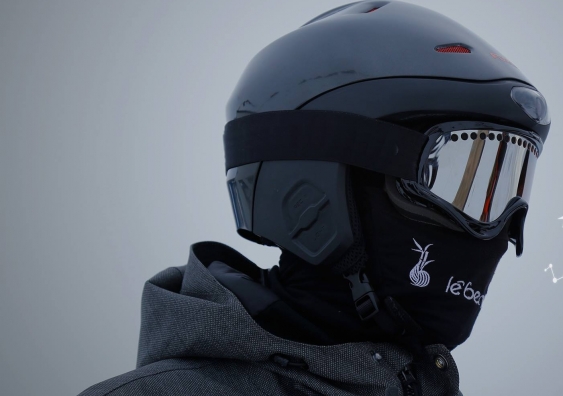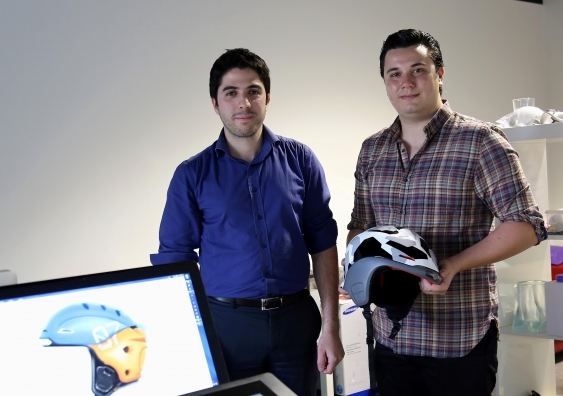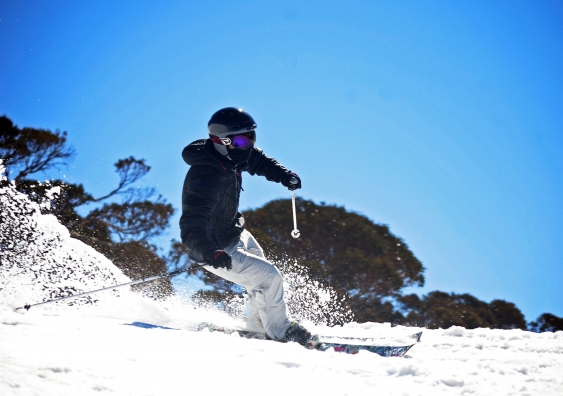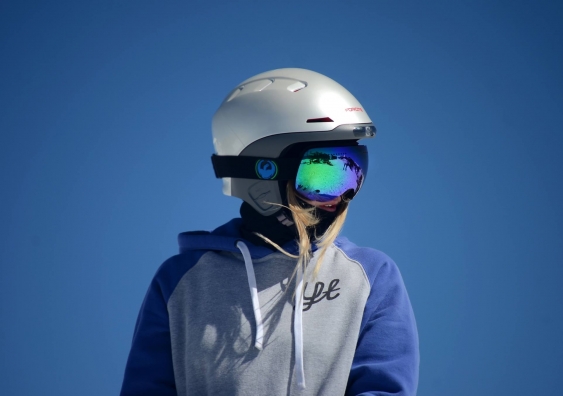UNSW grads launch super ski helmets on Kickstarter
A team of UNSW design and engineering graduates inspired by cult figure Robocop have turned to American crowd-funding platform Kickstarter to deliver the world’s first intelligent ski helmets.
A team of UNSW design and engineering graduates inspired by cult figure Robocop have turned to American crowd-funding platform Kickstarter to deliver the world’s first intelligent ski helmets.

Wendy Frew
UNSW Media Office
9385 2481
w.frew@unsw.edu.au
An Australian start-up company led by three UNSW graduates has turned to an American crowd-funding platform Kickstarter to launch its latest product – the world’s first intelligent ski and snowboarding helmet.
After just one day, 64 backers had already pledged more than $50,000 – a quarter of the company’s $200,000 target, with all of October still to go.
The helmet, which meets all global safety standards, was developed by UNSW Industrial Design graduates Alfred Boyadgis and Julian Chow, and engineering graduate George Constantinos.
“We’re an Australian company, so we also want to get some exposure on a global stage which Kickstarter helps us do. About 85% of pledges are usually from the United States.”
It features a built-in HD video camera with image stabilisation, GPS technology and speakers for listening to music, impact sensors, trail lights, and a noise-cancelling microphone that lets users communicate with friends.

UNSW Engineering graduate George Constantinos and Industrial Design graduate Alfred Boyadgis, with the Forcite helmet
When used with the corresponding mobile app, users can quickly compile highlight reels from their ski adventures, and compare stats about speed, altitude, distance covered, and airtime.
In 2013, the trio of UNSW graduates founded Forcite Helmet Systems, which is developing intelligent helmets with applications for extreme sports, motorcycling, mining and construction, defence and law enforcement.
“The head is where everything happens and a helmet is a great platform to fit all these electronics to provide extra information such as your speed or where your friends are.”
“The head is where everything happens and a helmet is a great platform to fit all these electronics to provide extra information such as your speed or where your friends are,” Boyadgis told the UNSW Newsroom in February.

In March the team soft-launched its intelligent ski helmet so it could be trialled by early adopters during the Australian winter.
Since that time, Forcite has had more than 15,000 likes on its Facebook page and 2500 expressions of interest in the product.
Boyadgis expects upwards of 30,000 helmets, which will retail for more than $799, to be sold by January 2016, to coincide with ski seasons in the northern hemisphere.
Forcite’s director of business strategy, Michael Drysdale, told the Australian Financial Review that they decided to sell the product through Kickstarter to test the overseas market.

Forcite's "intelligent" helmet for the ski slopes. Image supplied
“We’re an Australian company, so we also want to get some exposure on a global stage which Kickstarter helps us do. About 85% of pledges are usually from the United States,” Drysdale told the AFR.
"People can say they love your product, but the only way you really know they do is when they have to open up their wallets," he said.
In its two years of operation, Boyadgis says Forcite has raised $1.4 million from Australian investors, on top of a $900,000 grant from NSW trade & Investment.
It’s helped the three-man venture blossom into a team of 25. And while they want to keep the R&D based in Sydney, Boyadgis says they plan to open sales offices in Europe and North America.
Forcite has also teamed up with a foreign car manufacturer and an energy drink company to develop intelligent helmets for motorcycles and other extreme sports.
As part of his final project at UNSW in 2013, Boyadgis designed and prototyped an intelligent motorcycle helmet for police officers.
The helmet, which received interest from police agencies locally and internationally, was shortlisted for a Red Dot Design Award and finished runner-up in the 2013 Australian James Dyson Awards.
Boyadgis credits his UNSW instructors who encouraged him to be “free with ideas” and to dream up cool products that users wanted, without worrying – initially – about how to manufacture them or make a profit.
Follow the Kickstarter bid here.
Read more in the Australian Financial Review, and at CNET .